MAY 12: The day began early, or at least early for what I have been used to: it is quite light out here by five in the morning, and we were trying to get on our way by seven thirty or so. Lily (the manager of community projects here) and Joe (Lily’s assistant for community projects and my guide and translator) were running around the office, packing tents, sleeping bags, and food for our eight to nine day journey. One thing I realized right away was that my solar backpack was NOT going to be adequate for this sort of thing. I had packed in it a few changes of clothes, toiletries and medicines, my passport, and all my recording equipment – audio and video, as well as the sheet music, a pitch pipe, and several wonderful pencils from the URI Department of Music to give out as gifts to members of the choirs (the types of pencils that change color from blue to white when you hold them or apply another heat source). I felt pretty good that I had managed to cram all of this into my backpack and the dry sack I had brought along to protect equipment on boat rides. When I saw Lily and Joe would have to carry my tent and sleeping bag because there was no way I could do it with the backpack I brought, I realized things were going to have to change for the next trip, but it was too late now. They gave me a big water bottle (and each took one for themselves), and we were off.
We set out around eight in the speedboat, bound for Cobue (which is also known as Khango). As you may be able to tell from the previous entry, Cobue is sort of the “big city” of the area; and Lily and Joe had to buy some more provisions for our trip. At a market stall, they bought eight bags of pasta and five or six cans of tomato sauce, which Joe promptly loaded into his provisions bag. His backpack was enormous – his was wide and Lily’s was tall. Both of them were very kind and bore the extra weight without saying anything. “Never again,” I resolved.
Normally, they would have disembarked in Cobue and have continued from there, but since this was my first time hiking in the Equatorial sun, we got back into the boat and traveled another hour or so to the next village north, Mataka. Here we left the boat, put on our packs and got ready for the hiking portion of the day. By now it was around ten o’clock or ten thirty, and the sun certainly was rising high in the sky. The nights can get quite cool here – I estimate between 55 and 60 F, but the days quickly warm up into the upper 80s or 90s.
We had four villages to go through (townships, really): Mataka, Chigoma, Uchesse and finally Ngofi, the northernmost village in the Manda Wilderness. The estimated time of the hike was three to four hours, but I learned quickly that all reckoning by a clock here must be an estimate. At all times, if one meets someone that anyone in the hiking party knows, everyone must stop and have a brief visit before moving on. This happened rather frequently, because both Joe and Lily travel extensively in the villages.
I spent the first part of the hike simply absorbing the fact that I was actually doing this. There are no roads in this area at all, only footpaths. The paths are usually hard-packed dirt, but sometimes are stony. In places, tall grasses close in to the path and hit your face over and over as you walk through them. Streams and rivers often have bridges, but they are made of one or two (three if you are lucky) branches lashed together, and they wobble as you walk on them. I was beginning to understand that I should not bring a dry sack next time, since I needed both hands for balance. Still, I managed. And I was looking around – everything – the plants, the birds, the houses, the smells – everything was new to me, and I was trying to take it all in.
While in Mataka, we passed the church during worship. Joe and Lily asked to call out the chief of the village to remind him of our return in a week to work with their choir. They had sent a letter to each village asking if each would like us to come on such-and-such a date to work with their choir. These letters are not sent by post office, since I haven’t seen one yet; rather, they are delivered by friends or trusted acquaintances. It is very important to follow up on a letter one has sent, since that friend or acquaintance may forget to deliver the letter, and it is entirely possible (indeed, fairly common) that it did not reach its intended destination. While the three of them were conversing, I looked into the church (and felt a lot of stares coming my way, but that was to be expected). The choir was singing and dancing at the time, and I really wanted my first glimpse of an African choir. To my surprise, they were facing the altar, not the congregation. As I thought about it later, it made sense, since this was worship and not a performance. They were quite good, and seemed to be in their late teens or twenties for the most part. I felt much better having an actual reference point as to what sort of choir I might be working with during the week.
After Mataka came Chigoma, which was my favorite of the four villages just from first impressions. We met five of the nine schoolteachers who worked at the village’s six-classroom school (a very large school for the area, I would learn later). Chigoma had a tidy central hub that was almost like a town square, with a few shops arranged facing one another. Most of the time, these small shops appear willy-nilly and in the most unexpected places. Sometimes we would be hiking and see nothing around at all indicating human habitation but a little enclosed stall and a sign advertising phone cards for sale. I wondered who would be buying them. Anyway, Joe bought some new sandals in Chigoma. He was doing the hike in flip-flops, while Lily and I were in hiking boots. Unfortunately, Lily’s boots were in disrepair from ten years of hard use, and the sole of one shoe was flopping loosely. She changed into her sandals and kept going. I had only brought my hiking boots, but they were almost brand-new. I had a feeling they weren’t going to stay that way very long.
The day was getting very hot, and I was quite drenched by the time we got to Uchesse. Here we stopped in the dooryard of the house of the chief (mfumu) of the village and had the lunch the Nkwichi kitchen had made us. The chief of Uchesse is a very tall man and very funny. I liked him right away. A woman I learned later was his wife had a grandchild in her arms. Lily asked if she could hold him (Eusebio was his name), and his grandmother gave him over quite willingly. Lily left her hiking boots with one of the chief’s sons to repair and to pick up on our way back. We each had two rather dry sandwiches, which I had a little trouble choking down. I was trying to conserve water, and I felt very jealous of Joe, because the amayi (woman of the house) brought him a whole pitcher of clear water, which I knew I couldn’t drink. Lily had brought water treatment tablets, but we were not using them yet, since we each had water from the lodge in our bottles still. I would gladly have downed all my water AND that in the pitcher if I could have, though. I consoled myself with the thought that Ngofi was the next village, so we were almost there.
Unfortunately, Ngofi is a very large township, and the distance we had yet to traverse was more or less equivalent to what we had already done. By now it was the heat of the day. The terrain now seemed to me to be an endless progression of some type of saw grass, long stretches of open, hard dirt road in the blazing sun, and the occasional blessed lone tree that provided ten seconds worth of shade. It wasn’t the distance at all (thank goodness for all that walking I did at home before coming!); it was the heat and that sun. Of course I couldn’t say anything, because Lily and Joe were carrying my tent and sleeping bag, and they showed no signs of needing to stop. Meanwhile, we were constantly passing women with huge twenty gallon buckets of water on their heads and children tied to their backs, or men carrying giant loads of firewood on one shoulder. I made up my mind to shut up and do my best. I was starting to feel a little chilled, though, and I stumbled crossing one brook, though I didn’t fall in. I was recognizing the beginnings of mild sunstroke and knew I would have to say something soon.
As luck would have it, that was right about the time (about 3:30) that we reached the compound of the mfumu of Ngofi, who was nowhere to be found. The chief’s compound was a collection of homes, a common family arrangement, around a borehole well. This is the best kind of well, because it drills directly into the water table and provides water that is actually quite pure and safe to drink. How unfortunate that it was broken. No drinking water that night! I had saved two or three swallows in my water bottle, and that would have to be enough. The amayi, who was home, heated up some water in a small basin for us to bathe in – me first as honored guest, then Lily, then Joe. We didn’t actually step into the basin, but we used our hands to pour the water over ourselves (there was no cup to scoop the water). Thus refreshed, we set up our tents and Joe prepared a spaghetti dinner. There were no onions at the lodge, so it was simple spaghetti and tomato sauce. I had hoped to drink the tomato sauce, I was so thirsty, but the pasta was only lightly coated. Due to dehydration and sensory overload, I was not very hungry, which surprised my travel companions. I crawled into my tent. There were no pads to put under our sleeping bags, because others had them on another trip to different villages. The ground was rock-hard, but I knew it wasn’t going to make a bit of difference that night.
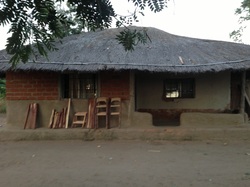 The chief's house; he is a carpenter. The chief's house; he is a carpenter. And so it was that, five days after landing in Africa for the first time, I found myself in one of the remotest parts of the continent, sleeping as a guest of an absent chief in a village I did not know. Choir training tomorrow.
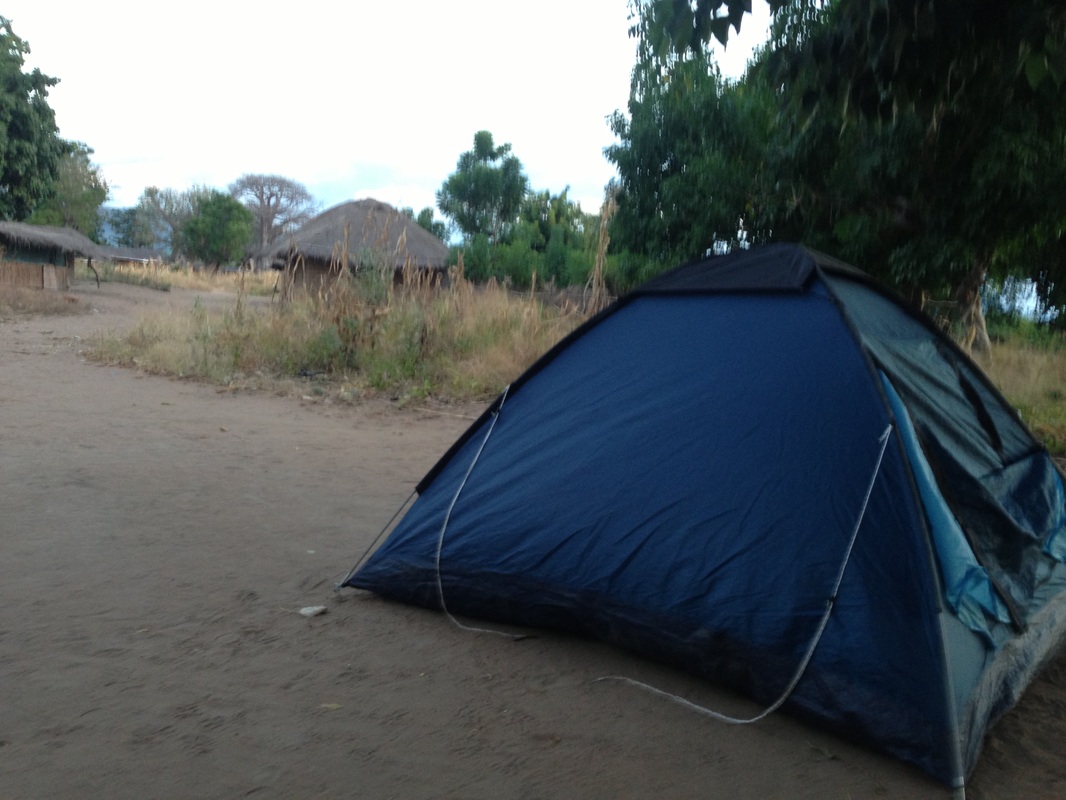
My house; I am an itinerant choral director.
This post was written May 11:
My stay at Nkwichi has been brief; I am going out to the villages for the first time tomorrow. In my one full day at the lodge, I can say that I have met many people on the staff, moved into my hut, seen my first vervet monkeys (which seem cute to me now but apparently can be quite the pests), skinks, geckos, bee-eaters ( a beautiful bird that looks a little like a giant hummingbird but builds its nest in the ground), African cockroaches (which are HUGE) and some type of giant flat spider with orange and black legs that was crawling inside my mosquito net until I coaxed it out with a piece of paper. I have heard bush babies crying in the night but have not seen any yet. They are small nocturnal lemur-like creatures whose eyes glow yellow when light shines on them in the dark. The staff has assured me that any eyes I see like that at night are most likely bush babies and not leopards, which are also around and whose eyes also glow yellow at night. I plan to stay away from trees at night as much as possible, just to be sure.
Today (May 11) was spent preparing for my first journey out. I will be going to four villages in eight days. Tomorrow will be a travel day, with a four-hour boat ride and a three-hour hike with all our supplies including food for a week. The next day I am working with the choir in the village of Ngofi. The following day we hike to Uchesse, where I will work with the choir the next day, and so on. It sounds a little grueling, considering I hadn't even left for Africa five days ago; but that's what I came here for, and I wouldn't miss out for the world! I've come too far for that....
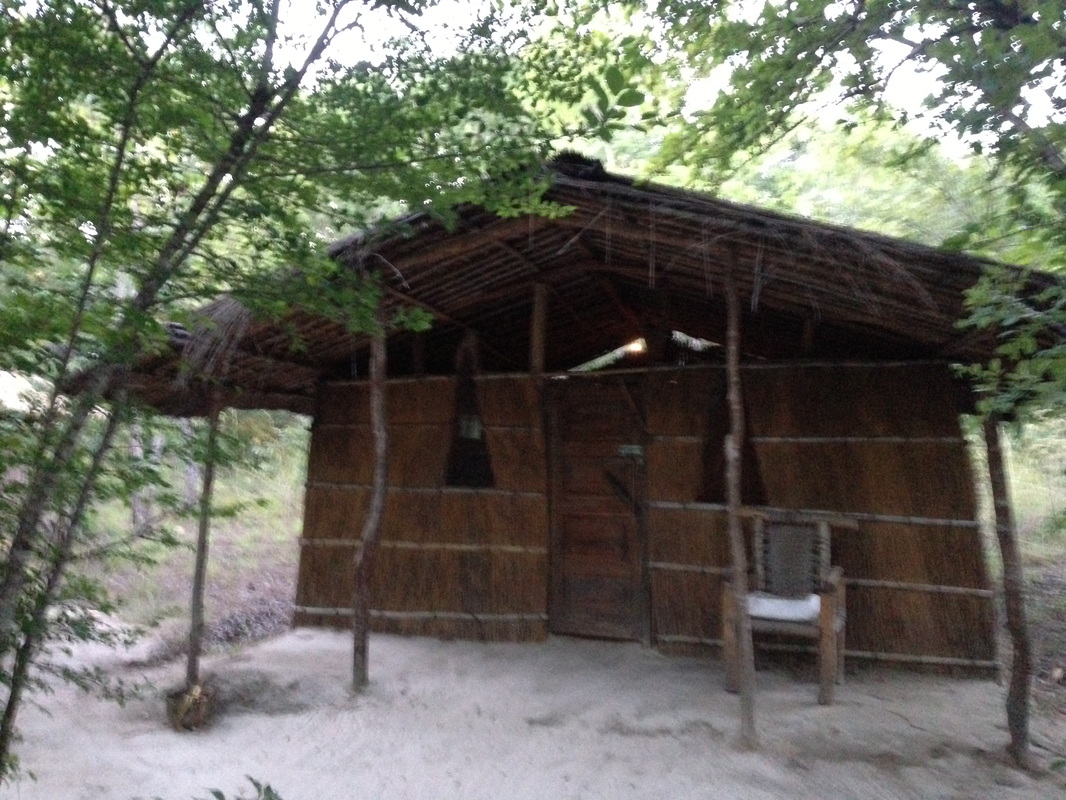
My spacious hut in Volunteer Village at Nkwichi Lodge
I used much of my time today getting the songs ready that I will be teaching the choirs. I brought music for several pieces, but after listening to a lot of radio online from Malawi, I have settled on two pieces.
The first is a canon that I learned from a Burundian man. He said they used it in the refugee camps there to help mollify conflicts among various factions. The text is adapted from John 14:27. It simply says "Let not your heart be troubled; I bring you my peace." I love everything about this round, so I translated it into Chichewa when I was still in the States.
The second piece I settled on is a song from the Caribbean: "Balia di Sehu," by Eduard Toppenberg. The piece has rhythms characteristic of Caribbean music, a type of music that is much favored here (especially Reggae). I bought a bible while in Lilongwe, and thumbing through it I got the idea of fitting parts of the 23rd Psalm to this piece.
I used much of my time today to make sure my songs were properly arranged and that the text had correct stresses, so I entered them into the computer and printed them out. Next I ran them by one of the skilled singers who works at the lodge at other jobs. He corrected my grammar in a couple of spots and my spelling in another, so I feel much more confident that the pieces are acceptable at the textual level. Now it is a question of the choirs liking them and wanting to do them together. That is of course entirely up to them.
Incidentally, the meals here at the lodge are truly unbelievable. The breakfast for staff and volunteers is a roll and coffee or tea at 6:30 (!), but the lunch today (noon) was two kinds of quiche, a bulky bread, pasta and citrus ice cream (a combination of lemon and orange made into ice cream in the kitchen here). Last night’s dinner (dinner is at 7) was a local fish steamed in a husk of some sort and wrapped with a local grass to hold it together, along with potatoes, carrots, green beans and some sort of cheesecakey dessert. Tonight was a chicken in a gingered cream sauce along with fresh guacamole, bread, fried pumpkin sticks, green beans and cake for dessert. Most of the produce is locally grown as part of the Manda Wilderness project. I don’t think meals will be that luxurious while we are on the trail. I hope not anyway, since we will have to carry it all!
There is so much to learn here, and it seems very odd to think that I will have been here for nine days and only spent one of them in my hut! Onward…!
In order to keep the narrative clear, I will continue from May 10, the day I left Lilongwe. I will be back from village trips tomorrow and will continue writing later this week.
I arrived at the airport and signed in with the charter flight company. The woman behind the desk weighed my baggage, then me, then told me I could go anywhere in the airport and that she would come and get me when the flight was ready. She recommended that I go upstairs. This was basically an open-air observation desk that had a restaurant and bar, the bar being fully subscribed at nine in the morning.
I watched a Kenya Air flight take off and saw a pilot go to a small plane and begin to do maintenance. At quarter to ten, not quite being disabused of my North American habits, I began to worry that I had been forgotten. I had visions of the flight leaving for Likoma with all the happy tourists but without me, so I came back downstairs, only to see my luggage still behind the desk at the charter company. Nevertheless the nice woman said that it was time to go, and she would ask the police to let me into the domestic flight boarding area.
Thus it was that I followed a policewoman who unlocked the glass doors and let me into a boarding area that could seat around 100 people. Nobody else was there. "Are you the only one?" she asked, a bit dubious. "I didn't think so," I said. I waited about five minutes, then I saw the woman from behind the desk pushing a cart into this room, with my bag on it. Now that she was standing away from the desk, I could see that she was pregnant. I asked where the rest of the people were. "You are the only one on this flight," she answered. "Which plane?" Of course it was the tiny one the pilot was doing maintenance on earlier.
"Just a few quick instructions," said Jeremy the pilot after making his introductions. "This could be a bumpy ride, so here are the airsickness bags. Also, we will be going over a lot of water, so here is the life vest. Okay? Good. Why don't you get in the front with me?"
Next thing I know I am in the co-pilot's seat, complete with my own controls and disabled steering (I assume it was disabled!). All through the flight I was so tempted to grab it and make airplane noises. I anticipated I would be afraid, since I don't like turbulence at all on jumbo jets, but I actually surprised myself by getting excited at the thought of flying across Malawi in a small plane. Once we got high enough, the ride was actually quite smooth, and the view was spectacular. The hour flew by (pun intended) with my own solo tour of the countryside by air.
Likoma airport consisted of a nice flat building the size of two or three classrooms, with five people inside: a woman who came out and gave the pilot a flight log to complete, and four men inside around a table playing cards. "Drink Carlsberg Beer," the sign on the wall said. "It's Family Fun." After fifteen minutes, a man drove up and told me that we were waiting for other guests to arrive for the boat to Mozambique, but we would drive to the immigration office and wait in the village.
Our jeep sped off on a very rutted and stony dirt road into a collection of huts, stores and schoolchildren walking on and off the road. "Jesus Is King Barber Shop," "Blessings Upon You Grocery Store" and the like, in English and Chichewa, ran all down the road. We slowed down in front of one concrete building with a public service announcement painted on it. It had a drawing of a smiling square with a balloon coming from its mouth: "Ndine Sopo" (I am soap).
Three buildings down from this toward the shore was a long open air stall, with a woman cooking something outside behind it. A man in a military uniform was standing off to one side, and two men in police-type uniforms were in another corner. There was also a man in t-shirt and shorts - they wear shorts in the villages at times. This man was the immigration officer, for this was the immigration office of Likoma Island.
After a few questions and considerable confusion from the police, who appeared to be trainees, about which stamp to use and where it should go, I was sent on my way. At this point it was noon, and I learned that the other guests would not be arriving for three hours. There was nothing to do but wait, so I was escorted to a restaurant right by the shore with the promising name "The Hunger Clinic." I ordered an orange Fanta and waited. And waited. And waited. I knew the waitress was irritated, but my travel companions (two by now) had gone off to buy supplies for the lodge and left me there, while my exit visa had already been stamped. I supposed as long as I left the same day, I was still okay.
After three hours, we were ready to get on the boat with my luggage, two cartons of bottled soda, four cartons of eggs, six containers of gasoline and three of us. We left the village port and set off for the beach at the airport. There we picked up the two guests from Great Britain and set off on our way to Cobue to get our Mozambican visas.
At Cobue, we grounded the boat and all hopped off. It was washing day, and two women were pounding dirty clothes in the lake, while colorful clothes of all sizes and descriptions hung out to dry on vast wooden poles mounted sideways all around the beach. We left the beach and went up a steep and dusty hill on the right, avoiding small children and goats as much as possible. When we reached the top, there was a concrete building that looked a little like a bathroom at a national park. "This is considerate after this long day, but I really just want to get this done right now," I thought. It was the that I noticed that instead of saying "Men" and "Women," the signs read in Portuguese "Immigration" and"Police."
We entered the immigration side, and with a combination of English, Portuguese and Nyanja, all accompanied by the bleating goats just outside, we managed to get the job done - only after I paid for my $30 visa with a fifty and one of the officers has to run into town for change.
Once he came back with the money, we were back in the boat; and soon after passing a few crocodiles sunning themselves on rocks in the lake, we were at Nkwichi, my home away from home for the next three months.
This is a quick post to let everyone know that I am here and all is well. In my ten days in Mozambique, I have been in villages for eight of them - no Internet!
Here at the lodge, internet is quite slow; we are each limited to thirty minutes a day!
I will post as I am able, but probably no pictures for a while.
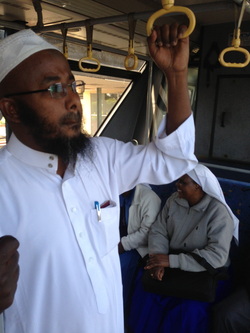 Arrival at Lilongwe was marvelous for so many reasons, not least of which was that I was completely "planed out" by the time I got there. The Kamuzi International Airport is nicely landscaped outside and has large welcome signs, visible from the tarmac, where we parked once again and took the steps down to another bus. The stairs were dry here, as we had crossed the equator into Winter and the dry season. I took this picture in the bus because I loved the juxtaposition of the Islamic man in thobe and kufi and the Catholic sisters in their habits. There was also a man with a yarmulke on the flight, but he was apparently unaware of my ecumenical photographic wishes, alas.
The bus let us off in a sort of open-air shelter with a tin roof; this was the place where the lines formed for Customs and Immigration. By chance, I was last in line. As I was about to step up to the next available booth for non-African Union Visitors, a policeman called me over into a side room. I have no idea why, as he was very friendly through the whole process. Maybe they heard about my run-in with the Italian carabinieri on another choral outing...?
"How long are you here?"
"Three days."
"Only three days? Just passing through?"
"Well, yes. I am going to Mozambique, but I am spending two days in Lilongwe and one in Likoma before I head over."
"Mozambique, eh? What a shame. Only three days, and two in Lilongwe? Where in Lilongwe?"
Of course that would be the moment I blanked on the name - twenty-six hours of travel can do that, I suppose.
"I don't remember. To be honest, I was trying to get out my laptop to look it up."
"I will wait while you do that. I should be most interested to learn. In the meantime, let me take a most beautiful picture of you. And would you please press your fingers on this machine?"
This is the fingerprinting machine (proudly manufactured by 3M) that is all the rage in customs lines now. It wasn't working.
"Press harder, please."
It still wasn't working. A second policeman who had taken interest in the proceedings came over and began pressing my fingers onto the machine. Hard. It still wasn't working.
"These machines were made in China, you know," said the policeman in a teasing tone. "Not like the ones we used to get from America." "Pepani [Sorry]," I returned. This one word of ChiChewa sent everyone into gales of glee, and I learned a valuable lesson that was reinforced throughout the day: an effort to acknowledge that one is in Malawi by speaking ChiChewa is almost universally appreciated. After much more pressing for each hand and both thumbs and many more "Pepani. Eeeee. Pepani"s, I was on my way. My luggage inspection was then very easy, but running the gauntlet of taxi drivers was not.
After having consistent failures at every ATM machine and phone store at the airport, I gave up and found my taxi. One man grabbed a bag, a child opened the door, I said "Zikomo, [Thank you]" as he led me to the other side of the taxi (with British colonial history, they drive on the left here and I had forgotten), and we were off.
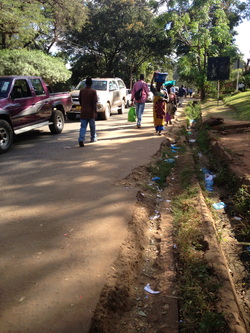 I wanted to write this extended first day entry, because I know my impressions will never be as fresh as they were today. How to describe that taxi ride? The taxi driver's name was Anthony. He made sure I knew it, and also that I knew his phone number. Driving people to and from the airport is quite profitable, with thirty-five US dollars being the going rate. Considering the average family income here is nine hundred dollars a year, it is little wonder that a taxi driver wants to get that return drive as well. We talked as we went, partly in ChiChewa (very little) and mostly in English. We were on a two-lane highway that was filled with as many bicycles as it was cars and trucks. Anthony was making those hair-raising split decisions that all city drivers make but that we only become aware of when they are different choices than we might make in our own country. On each side of the road was a dry, reddish dirt path on which people of all ages and descriptions were walking: students in uniforms just getting out of school and walking in small clumps (this was around 2 pm or so), women with masses of bananas or pails or bundles on their heads, a man with one tire around his neck and rolling another along the path, two men with giant pallets on their heads, mothers with babies wrapped in their zitenje [all purpose pieces of cloth women use for everything from skirt covers to baby carriers to load-on-head securers], just masses of people up and down a road that didn't appear to have anything on it to speak of - except for people.
"So, is this the main road to Lilongwe?"
Anthony's head snapped around. "The main road, yes. What, you have not been here before?"
"Oh, no." I said. "This is my first time in Malawi."
"Ahhh," he laughed. "Because my father told me when you got in, 'This man said Zikomo when I took his bag. I think he is Malawian!'"
We both had a good laugh over that, and from then on, whenever I said something in ChiChewa, it was enormously amusing to him. We stopped for mafuta [gasoline or oil] - because there is no meter and you agree on the rate beforehand, drivers my stop and do other things on the way. "Mafuta," I said. He laughed and repeated the word. We passed a new-ish looking factory where they processed tobacco. "Fodya," I said - a vocabulary word from Lesson One. "Eee, fodya." And so it went as we passed person after person, vehicle after vehicle, word after word - but very few actual places for mafuta or fodya. It was hard to see where everyone was going and why they were on the road at all.
"This town is very spread out, isn't it?"
"Eeee. Very scattered."
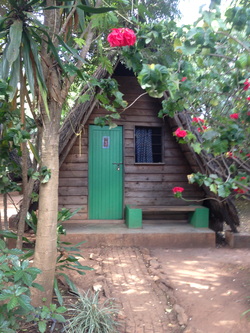 The exterior. Look at the blooming tree! Eventually we reached an area that looked a little more like a city.
"So," Anthony continued later, "You like this place you are staying?"
"I don't know. It was recommended to me by someone who lives here. You don't like it?"
"You could do better. Too many English people, if you ask me. But... you have to start somewhere."
At that point, we turned onto a short street and stopped in front of a bright green barred gate with lizards painted on it. Anthony honked, and a head peered out from a square cut in the solid metal gate. Seeing me in the back, the guard opened the door, and there I was. Here is my two-day home in Lilongwe.
This place is a compound of sorts, with people in lodges such as myself, others in dormitories, and some in tents. There also appear to be workers who live here. There are also showers and bathrooms that are communal (but with toilets and sinks with running water!), with helpful comments posted in each one such as: "If the showers are cold, try another block."
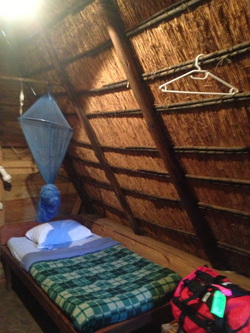 The small bed in the room. Mosquito net ready! When I got here I knew I would have problems with access to phone and internet. Not every SIM card is available, and most companies here are pay-as-you-go. I asked the person working the desk in the afternoon where to go to get to the bank and to buy air time, and she gave me directions to "Old Town."
Mind you, Old Town is not particularly Old nor does it have any appearance of a well-established Town, but in Lilongwe it is distinguished by the fact that it has a name. You see, most parts of the city are organized under a rather sci-fi system. So it is that someone might live in Area 23 or Area 14. So, Old Town has some claim to fame in that regard (though it is also Area 4). Old Town is not far from where I am staying, so off I went.
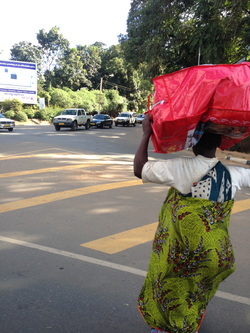 I don't know how to describe how wonderful that walk was - setting off in a totally foreign city where I was in a very obvious minority. I eventually found a bank that would dispense kwacha for me, and I bought my phone time the way one does in Lilongwe, from a woman by the side of the road sitting under a red Alltel umbrella. I went to the grocery store and bought water. I was approached by quite a few people from peddlers to beggars to students, and when I passed the open air market (which really had some incredible craftsmanship if only I had the room to pack any of it), cries of "Sir! Sir! Hello! Can I show you something?" filled the air. I found if I responded "Muli bwanji?[How are you?]," it unleashed the entire delightful social sequence that that opening mandates (very elaborate in Malawian culture), followed by smiles and thumbs up; and we could part ways in peace with no hard feelings.
Words and pictures cannot convey how alive the whole scene was. The traffic, the honking, the shouts, the markets, the farm stands by the side of the road (one older man had only three pumpkins to sell, a school child had gotten out of school only to set up a vegetable-turnover stand), the roosters crowing by the main police headquarters, women like the one pictured here negotiating busy rotaries at the height of afternoon traffic, a man who had to go and simply turned to a wall and urinated while people walked past unconcerned, a child guiding a blind old man in the middle of the traffic lanes in search of donations, the "minibuses" - a charitable term if there ever was one - packed to the gills with people and still stopping to let more on. I loved the totally bewildering, foreign and absolutely vital scene passing before me.
I also learned another important thing I will carry with me as I move forward: NO grown man here wears shorts, ever, unless he is a tourist. I sort of thought this from what I had read before I came, but it was confirmed today. They still have the old-fashioned system here that we once had in the United States: boys in short pants, young men (high school age and older) in long pants. Period. Indeed, many men had on winter jackets or sweatshirts. Maybe this is cold for a Malawian? It had to be in the 80s.... I was happy to see many men at least wearing short-sleeved shirts!
.....
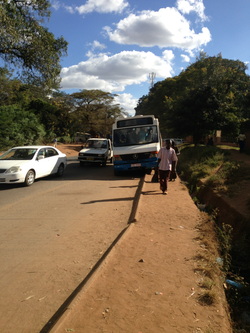 A bus driver, tired of traffic, creates his own lane, otherwise known as a sidewalk A man on a bicycle hailed me from behind me as I was walking up the main road back to the lodge. Oh boy, I thought, here we go again. Sure enough, "Sir! I have an important matter to speak with you about!" Okay, l thought. "Muli bwanji?" Sure enough, he was startled, but he completed the sequence. This unexpected turn threw him off his plan, but he was persistent. After pedaling away slowly (perhaps to think about it), he circled around and came back. "My brother has a precious stone that is burdening him, and I was wondering if you or anyone you know would be willing to assist him with this?" Another biker came by and heard this, slowing down and looking back at me with a big grin to see if I would be silly enough to fall for this. "Pepani, abambo. I am afraid I have had problems of my own. The banks have not been giving me money because my cards don't work in most of them - " "Ah, I see. Then perhaps you know someone else who might help my brother with this difficult burden? I saw you in Old Town earlier and hoped you could help me." "I am sorry, but I am still too new to town to know many people. I am afraid I cannot help." "Ah yes. I understand. Pitani bwino. [Go well.]" "Pitani bwinonso." [You, too, go well]. How could you blame him for trying?
So it was that I came home, set up my internet, and typed up these posts while waiting to eat. Dinner is served at the lodge from 6 - 6:30 (!), and you must provide notice of what you are going to eat by 5:30, so that the chef will prepare exactly enough.
It is "Winter" here, but it was dark quite early even by Winter standards - by 6 in fact. We are on the eastern end of the time zone.
For dinner I ordered my plate of Malawian rice and beans - how could I not my first day here? For 1600 MK (about $4.20), I got a full plate of rice, beans, vegetables and peri peri sauce (hot sauce from peppers and garlic) that was outstanding and just right. It has been a very full day, with much to think about, and I know I will fall asleep musing on all I have seen and done,
and wondering if my mosquito net has any holes in it.
That was the smartest thing I've never done before: staying awake the day before a long journey! It made the trip to Boston a little hair-raising, since I was moving a little slowly by the time we really should have been leaving, but Norma and I made it in time, thanks to her own intrepid driving (I mean that in a good way)! In fact, as it turns out, we had more than enough time. If you have a chance to fly Air Canada out of Logan for international travel, take it! They are in a different terminal from the rest of the international flights, which means the whole process is much less formal and the lines are very short. It only took me about ten minutes to get all the way through. In my first small taste of the day, though, we did have to wait for the TSA agents to get there to open the gates to start the day!
 A happy, dancing alphabet Toronto's airport was of course clean, efficient, polite and oh-so-up-to-date. I caught up with home with a cup of coffee at the iPad cafe with its banks and banks of iPad menu/browsers. Even while I was there I knew that this sight was going to strike me upon my return - it was striking enough as it was.
Then it was off to the gate to wait for the Ethiopian Airlines flight to Addis Ababa. I'm a sucker for foreign languages with cool alphabets, and Amharic is certainly such a language! All announcements were made in Amharic first, then English, and all signs were in both languages as well. I love, too, how the alphabet looks like people dancing - an auspicious beginning for that leg of the voyage!
It was this flight that made me most grateful that I had stayed up the night before. I was able to sleep from time to time; I think I may have gotten four to six hours, which is unheard-of for me on a mode of transportation of any kind. I normally get too excited to sleep at all. I can't say it was solid sleep, but sleep nonetheless. I could already feel my internal clock changing. Goodness knows that clock had plenty of time: I now know that a thirteen-hour flight is long enough for me!
Ethiopian Airlines also has a dedicated GPS channel on its video channels, so I kept that on my screen the whole flight to give myself as much context as possible. It was very interesting how familiar it felt to fly over Spain and Italy, countries I have been to before; but when the plane veered off from Sardinia and started heading south to Libya, the commitment I had made to the journey finally hit me. It was very strange and exciting even to fly over Benghazi in Libya, Khartoum in Sudan, South Sudan, and finally Ethiopia. Time for the real adventure to begin!
Addis Ababa: Upon landing, the first thing one could notice was that there is both a building boom and a cycle of abandonment going on. In the distance were many cranes building high-rises of many sorts, but the airport also serves as a parking ground for what looked to me like abandoned airplanes, left to rust. So it was too with many one-story buildings; once they have served their purpose, the roof - usually tin or thatch - steadily deteriorates, leaving only the bricks of the walls. Of course, that would make it that much easier to rebuild them, too.
Leaving the plane, I let a mother go ahead of me who had been trying to corral her two children and their luggage. The boy and girl could have been no more than five and three respectively, but each of them had a standard piece of carry-on luggage to corral, as did the mother. "Children, these people are waiting for us, so chop-chop!" When she turned around, I saw why there was so much luggage. What I thought had been a sash around her waist actually contained a small baby, surely no more than three months, wrapped tightly to her back as she reached, bent over, whipped left and right, corralled and marshaled her way to the door of the plane. The baby was silent and wide-eyed; I think I would have been, too.
The airport itself was renovated in the early part of this century, but I'm afraid the part of it that I saw was upgraded to a strange sort of 1970s standard. We landed on the tarmac and left the plane on the old-fashioned stairs. That meant mother, infant and two small children headed down those old stairs on which it had recently rained - yes it was slippery! Fortunately, someone with an imposing uniform got the luggage halfway down and carried it as far as the bottom of the steps.
A crowded bus ride later and we were let off in the lower floor the Terminal 2. This was a very strange place, with nobody there but the passengers from that flight only and airport staff stationed every three hundred feet or so to ask where you were going. Naturally, the flight to Lilongwe was at the very end, Gate 1, so I underwent the entire gauntlet. Fortunately, everyone was absolutely positive that we would be leaving from Gate 1 - everyone but the people actually at Gate 1, that is, who had to call authorities over to confirm this fact. Once cleared and sent on my way, I could understand the confusion: Gate 2 and Gate 1 are actually the same thing, and had I boarded the plane at "Gate 1" I would have been on my merry way to Johannesburg. There was nobody at the top to guide me, but instinct told me to go to the right off of the jetway (I had overheard someone somewhere say something about Gate 1 not being straight ahead). My instinct led me back into a security area with a mass of people waiting. I asked a few if they were going to Lilongwe, and after getting three or four responses in the affirmative, I decided to chance it. We waited for forty minutes after the supposed boarding time, and then with no announcement at all, sixty people or so got up silently but en masse and began running toward a line that appears to have been created by a person giving a visual signal. So it was that we all boarded en masse after a cursory ticket check: no front, back, disabled, elderly etc. We were spirited again into a bus, which narrowly missed the surreal woman in a headscarf with a broom and dustbin, sweeping who knows what between roaring jet planes in the middle of the tarmac in the rain. The bus careened and swerved and took us - exactly across the tarmac from where we had come from the previous flight!
It was thus that we all went up another set of slippery stairs into a 737 and began our way to Lilongwe, which I will continue in a second post.
So, just what is this all about anyway?
Good question! I'm not entirely sure myself yet, but let me try to answer that as best I can right now:
For the next three months (more or less), I will be serving as the Guest Choir Director for the Manda Wilderness Choral Festival. To quote from the description of this position that I first saw at the end of last year: The primary purpose of this position is to help plan and run the Manda Wilderness Choir Festival. In its fourth year, the festival will take place on July 27, 2013, and will bring together villages and choirs from the entire Manda Wilderness area. The Guest Choir Director would be responsible for touring the participating villages and delivering training sessions to each village choir prior to the festival.
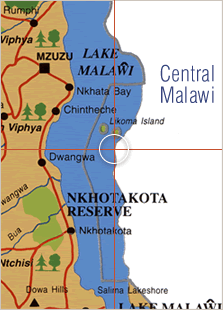 So it is that I start on a journey to a place I don't really know at all yet! The map on the right is helpful, even if a bit confusing. It comes from the Malawi tourism council, so naturally it emphasizes the wonders of Malawi. Thus it is that the map proudly says "Central Malawi" over a part of land that is not part of Malawi at all, but Mozambique. The circle is over the spot where Manda wilderness is, specifically Nkwichi Lodge, the headquarters for all who come to the Manda region. The lodge is so nice that the Malawi Tourism Council sees fit to promote it as part of its own country's tourist draw. I certainly take this as a good sign!
The crooked red line running from the top to the bottom of this map marks the boundary between Malawi to the west and Mozambique to the east. You will note the jut into the lake; note also that there are two dots above the white circle: these two dots are island exclaves of Malawi; that is, they are small parts of Malawian territory completely surrounded by Mozambique. The eastern island of Likoma, as well as the Mozambican mainland in and around the white circle, will be the primary focus of my time in Africa this Summer.
From the base at Nkwichi Lodge I will be hiking from village to village in the region to see if the local choral directors would like any support or assistance as they prepare for their July festival. I will also be teaching a song or two to all the choirs to sing together at the festival, assuming they approve of any of the selections I am bringing (or perhaps as they create their own selection!). Naturally I expect to learn a lot from this experience; indeed, I already have.
One of the first lessons I have learned is to be as flexible as possible. Currently I am writing this as part of an all-nighter, preparing to board the first plane fo this morning. My itinerary will involve about twenty-four hours of flying: Boston (at 6:30 a.m.) to Toronto to Addis Ababa (Ethiopia) to Lilongwe (Malawi). I thought I would be taking a charter flight right out to Likoma (remember Likoma? see above), and from thence taking a boat the rest of the way to the Mozambican mainland. As it turns out, however, the flights to Likoma are full until Friday, so I will have a couple of days to get to know some of the Malawian capital before I make my way to my Summer destination. That's fine! If nobody else is bothered by such changes, then I see no reason why I should be either.
Barring any further surprises, I think my next post will come from Africa. Lilongwe? Perhaps. Likoma? Maybe. Nkwichi? Who knows? That's adventure!
A quick note about blog format: Until I get to Manda Wilderness and see how internet access works, I am disabling comments on the blog. I would not want comments to go unmoderated for too long, or the comment section might be awash in spam! Once I understand more concerning my temporary home this Summer, then I might be able to lift the restriction. Thanks for your patience!
Publishing a blog appears to be as much a part of the modern-day process of preparing to go to Africa as are getting all the shots, buying the supplies and making list after list, plan after plan. I promised myself not to make this first entry too complicated - just enough to make the rest of my learning curve a little less drastic when I have so much to learn next week.
For three months now, I have been looking for possible music pieces I can bring with me. For three months, I have been learning ChiNyanja, also known as ChiChewa, the local language of the Manda Wilderness. And for about six weeks, I have been trying to get ready physically, taking a walk almost every day, going up to eight or nine miles on the weekend.
I've learned a lot.  A view not one mile from my home... who knew? One of the biggest things I've learned while breaking in my hiking boots is just how much I've missed walking! From childhood all the way through graduate school, walking was my primary form of transportation, at least when I was responsible for getting myself somewhere. Even at my first job in Montana, I would walk whenever I could - well, at least whenever the temperature was above zero!
Life has a funny way of moving us to different places of course, and it has become more challenging if not impossible to walk as I used to. Work and home are not nearly as close to one another as they were then (not at all close, in fact). The next thing I know, I am not walking anywhere any more. I already owe Africa the gift of restoring my love of walking about, learning what is just outside my door and not just across the globe.
It is not particularly easy to walk here in this corner of New England. Sidewalks are often an afterthought if they exist at all outside the cities, where they are not usually particularly well-maintained. Drivers often seem to resent sharing the road's shoulder with those who move along it at a slower pace. I have taken to carrying a walking stick with me on my journeys, because I have discovered that while a driver might not move over for me, that driver will move over if getting close means that their car's paint might possibly get scraped by a stick!
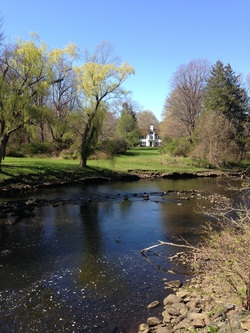 kumudzi kwathu The best part of walking again has been the feeling of a strong sense of place again, of being grounded where I am. My home is no longer set in a vast swath of unknown woods, yards and houses I only glance at as I whiz by on the asphalt ribbon that divides us between what we see and what we actually experience. Now I have walked my neighborhood, the surrounding neighborhoods and even into other towns.
I know that the relationship one has with one's village is of great importance where I will be going, and that questions about how things are kumudzi kwanu (at your village) will be a common greeting. I am keeping these pictures and others with me to show any I meet there who wish to know more about the place where I normally live.
In ChiNyanja, one does not say "in my town." Rather, you must always refer to it as "in our town (kumudzi kwathu)." A community is simply not a place one can claim to possess for oneself, unless perhaps one is the chief of a village. Your home is a part of you; and you are a part of others, their lives and their own sense of place. Village is a communal concept at all levels. I find this comforting, even as I find it unsettling: this is certainly not how I have led my life heretofore, or at least not in a good, long while.
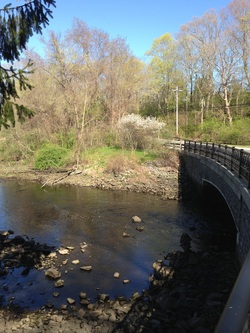 Soon enough I will be writing more details about my adventure: what brought me here, what I will be doing and what it is like to do it - whatever it may turn out to be. For now, though, it is enough to honor the journey as it stands now and to look around at every bend so that I can see where I am, not just where I have been and where I am going.
Ali dere nkulinga utayenda naye.
To say that someone is a certain way means that you have walked with him.
|
 The chief's house; he is a carpenter.
The chief's house; he is a carpenter. 












 RSS Feed
RSS Feed